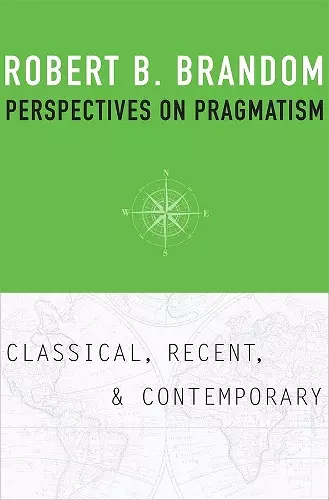Perspectives on Pragmatism
Classical, Recent, and Contemporary
Format:Hardback
Publisher:Harvard University Press
Published:9th Nov '11
Currently unavailable, and unfortunately no date known when it will be back

Another collection of fascinating essays by one of contemporary philosophy's deepest thinkers. Robert Brandom is almost unique in our generation in combining an illuminating, syncretic, historical perspective, with a highly original and often richly detailed extension of the tradition about which he writes so well. -- Huw Price, University of Sydney Robert Brandom is the preeminent pragmatic thinker of his generation. Here, he traces the roots of pragmatism back to Kant and Hegel; argues that it has been developed by Heidegger, Wittgenstein, and the "classical" American pragmatists (Peirce, James, and Dewey); and further refined by such neo-pragmatists as Sellars, Rorty, and Putnam. His interpretations are frequently controversial, but always thought-provoking. Against this rich tradition, he hones his own version of a linguistic analytic pragmatism. Anyone interested in pragmatism in all its varieties, the state of contemporary debate about pragmatism, or Brandom's own ambitious philosophic project, will find this book invaluable. -- Richard J. Bernstein, New School for Social Research
Pragmatism has been reinvented in every generation since its beginnings in the late nineteenth century. This book, by one of our most distinguished heirs of pragmatist philosophy, rereads cardinal figures in that tradition, distilling from their insights a way forward and closing with a clear description of the author’s own analytic pragmatism.
Pragmatism has been reinvented in every generation since its beginnings in the late nineteenth century. This book, by one of today’s most distinguished contemporary heirs of pragmatist philosophy, rereads cardinal figures in that tradition, distilling from their insights a way forward from where we are now.
Perspectives on Pragmatism opens with a new accounting of what is living and what is dead in the first three generations of classical American pragmatists, represented by Charles Sanders Peirce, William James, and John Dewey. Post-Deweyan pragmatism at midcentury is discussed in the work of Wilfrid Sellars, one of its most brilliant and original practitioners. Sellars’ legacy in turn is traced through the thought of his admirer, Richard Rorty, who further developed James’s and Dewey’s ideas within the professional discipline of philosophy and once more succeeded, as they had, in showing the more general importance of those ideas not only for intellectuals outside philosophy but for the wider public sphere.
The book closes with a clear description of the author’s own analytic pragmatism, which combines all these ideas with those of Ludwig Wittgenstein, and synthesizes that broad pragmatism with its dominant philosophical rival, analytic philosophy, which focuses on language and logic. The result is a treatise that allows us to see American philosophy in its full scope, both its origins and its promise for tomorrow.
Another collection of fascinating essays by one of contemporary philosophy's deepest thinkers. Robert Brandom is almost unique in our generation in combining an illuminating, syncretic, historical perspective, with a highly original and often richly detailed extension of the tradition about which he writes so well. -- Huw Price, University of Sydney
Robert Brandom is the preeminent pragmatic thinker of his generation. Here, he traces the roots of pragmatism back to Kant and Hegel; argues that it has been developed by Heidegger, Wittgenstein, and the "classical" American pragmatists (Peirce, James, and Dewey); and further refined by such neo-pragmatists as Sellars, Rorty, and Putnam. His interpretations are frequently controversial, but always thought-provoking. Against this rich tradition, he hones his own version of a linguistic analytic pragmatism. Anyone interested in pragmatism in all its varieties, the state of contemporary debate about pragmatism, or Brandom's own ambitious philosophic project, will find this book invaluable. -- Richard J. Bernstein, New School for Social Research
ISBN: 9780674058088
Dimensions: unknown
Weight: unknown
248 pages